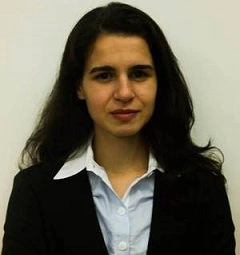How do you like Germany and which experiences have you made through AWARE?
Great - both the studies and my personal experiences. Personally I have matured. Related to my studies I could choose courses that interested me and expanded my knowledge. The research and test center CARISSMA (Center of Automotive Research on Integrated Safety Systems and Measurement Area) often offered lectures on automotive topics. I also had the opportunity to get to know some projects from Prof. Thomas Brandmeier's team, which are great and highly technological. Projects in which the industry is investing - something that could serve as an example and could be established in Brazil. Unfortunately I could not contribute anything to the team because I have too little technical knowledge. Nevertheless, Technische Hochschule Ingolstadt (THI) offers its students many opportunities, if they want to. Prof. Ulrich Schmidt, for example, offered me to learn more about the NAO Aldebaran robot in additional lessons.
What do you think are the biggest differences between your home town Curitiba and Ingolstadt?
The biggest difference is the size of the city. Curitiba is the capital of the state of Paraná and has about 1.864.000 inhabitants on 435 km². Ingolstadt, on the other hand, has about 130,000 inhabitants and only 133 km². Even though the stores close already at 8 pm, the city has very nice historical places and events, which are spread over the year and the whole city and make it more interesting. In Ingolstadt most people can speak a little English, which is very useful for exchange students as well as tourists. In Curitiba it is much more difficult to find someone who speaks foreign languages fluently. But what fascinated me most is the education of the Germans. Moreover, everyone is very friendly and helpful. The same applies to Brazil, but it is easier to make friends there than in Germany. I think that education is also reflected in the way the city is treated: it is always decorated, clean and well maintained. But Curitiba is also considered Brazil's ecological capital in this respect. The urban infrastructure is equally remarkable. Most of the bureaucracy that has to be dealt with is dealt with quickly and in a focused manner in one place, the city hall. If you look at Ingolstadt's transportation system, there are trains and highways that connect the city well with major cities like Munich. In Curitiba, on the other hand, there are still no trains. Nevertheless, thanks to its buses, it has one of the best public transportation systems in Brazil. The weather, however, is comparable. But I have already been told by friends that it is usually even colder in January and February (a cold I don't know yet). But in Ingolstadt, all houses, stores, universities and buses have heaters, so it is only cold outside on the streets.
What is the biggest difference for you between your university in Brazil and THI?
Like the city itself: the size. THI has about 5,000 students, while UFPR has almost five times as many. At THI, I noticed that many industries invest in the university and in research projects, which in turn improves the conditions in the laboratories and the university. This is something that should happen more often at UFPR. I also find the technology at THI interesting. That you can use your student card as a kind of credit card and that the library is partly open 24 hours a day. What frightened me, however, was the fact that there is only one exam for each course at the end of the semester. At UFPR there are usually 2-3 tests spread over a semester. Also the grading system is different. To get good results at THI, your grade must be between 1 and 4, where 1 is the best grade. At UFPR there is a grading system from 1 to 10, where 10 is the best grade and 5 is a pass.
What are your recommendations and tips for future students coming to Ingolstadt?
Follow the guide from AWARE. Be sure to look for an apartment from Brazil, because this is very difficult. You will see that it saves you time and money in Germany. It is great if you already speak German. If not, take a German course, even though Ingolstadt is an international city and you can use a lot of English. But German is the most polite language I know. Go to the orientation week, this is also very important! Doing an internship is also very interesting. Remember that many German companies are also in Brazil (e.g. Audi or Continental) and that it is a big plus in your CV to have already gained experience there. You can already apply for it from Brazil. If possible, save money for the weekends, travel and enjoy the time! Germany is beautiful and since you are in Europe, you can easily travel to other countries. Just be curious and find out more about the culture of your friends. It really makes you grow! And of course: study, because there is an exam waiting at the end of the semester.
Andressa Ruviaro Almeida, Bachelor student of Electrical Engineering with focus on Integrated Electronic Systems at the University of Paraná (UFPR) in Curitiba.
She participated in the exchange program of AWARE and studied for 6 months at THI in winter term 2014.

